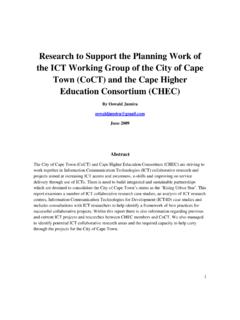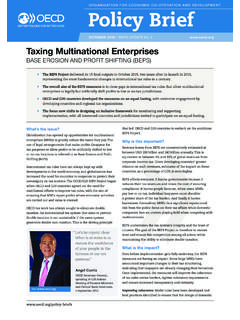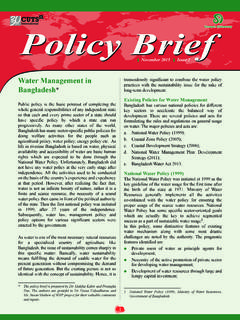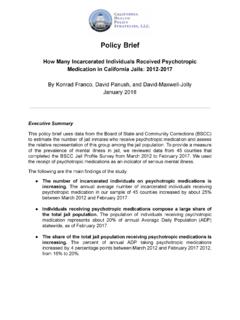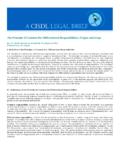Transcription of Support for building the next generation of …
1 Support for building the next generation of academics in South AfricaPOLICY BRIEFJuly 2014 Cape Higher Education ConsortiumC HECii1 >CONTENTS1. Introduction 22. policy propositions Comprehensive funding packages Supervision Mentorship Internal learning communities Exposure to external networks Creative institutional leadership Further development of successful programmes Focused funding of fewer initiatives Management, coordination and communication building the institutional and research cultures 7 Appendix 1: Investment approaches of four US Foundations 10 Appendix 2: Approaches to equity and transformation in three universities 15 Appendix 3: National targets 1921. INTRODUCTIONThis policy brief flows out of lessons gleaned in a review of the initiatives in equity and transformation in three South African universities funded over a six year period by Carnegie Corporation of New York (CCNY).
2 1 It also draws on findings of a review conducted for the Ford Foundation in 20112 as well as engagements with representatives of the Andrew W. Mellon Foundation and Atlantic Philanthropies. As this work has focused on initiatives that enhance research capacity development and postgraduate training in the humanities and social sciences, the findings may be particularly pertinent to these areas. Many of the lessons drawn from these reviews, however, are relevant to other fields. The importance of transforming the broader institutional culture with particular emphasis on research transformation has also been highlighted. The main audiences of this document are government departments, research foundations, higher education institutions, and local and international donors. It is aimed at assisting these key role players to respond to the shared goal of building the next generation of South African scholars and researchers.
3 As national and institutional targets are being set to increase postgraduate student enrolments, questions such as the following are being asked: What forms of Support enhance the quality and levels of success of post-graduate students? How can the use of available funding be optimised so as to enhance oppor-tunities for these students? How best can student Support programmes be conceptualised, lead and managed? How can greater numbers of black students be attracted into postgraduate studies? How can graduate retention within the academy be enhanced? What makes for a supportive institutional culture? What should be distinctive about building a sustainable research culture in a South African university?These and other questions point to the need for strategies that respond to the key challenge of increasing quality graduate output in ways that are equitable and responsive to the building of sustainable research capacities in South African CHEC (2014) Review of Initiatives in Equity and Transformation in Three South African Universities, com-missioned by Carnegie Corporation of New CHEC (2011) Review Report of Ford Foundation s Programme The next generation of >The document provides a number of policy propositions drawn from the reviews and engagements mentioned above, while the appendices provide additional background information as follows: 1.
4 brief descriptions of the investment approaches of four United States (US) Foundations: CCNY, the Ford Foundation, the Andrew W. Mellon Foundation and Atlantic Philanthropies. 2. brief descriptions of the approaches used by the three universities included in the review for CCNY the University of KwaZulu-Natal, the University of Cape Town and the University of the Witwatersrand. 3. Selected data which indicates the scale of the challenge facing South African higher education institutions in terms of the goals set in the National Develop-ment Plan (NDP). 2. policy PROPOSITIONSIn considering how the findings from the reviews may be developed into policy propositions, two key questions were addressed: What features or elements of postgraduate training and research capacity development programmes enhance individual students success and encourage them to consider future careers in academia?
5 ; and How can the individual benefits of funding and other Support provided be optimised in order to reach additional emerging researchers, to increase diversity and representivity in South African universities and to transform both the institutional and research cultures? While there are no quick fixes for meeting current challenges in higher education ( producing the next generation of academics, ensuring equity and encouraging transformation), the importance of the following propositions should be noted: Comprehensive funding packagesIt is recommended that comprehensive funding packages that Support the full costs of study (including the necessary time off for data collection, analysis and writing up theses) are provided in order to optimise training and development opportunities for individual students/emerging scholars.
6 Given that highly successful postgraduate programmes include additional activities (see points made below), comprehensive funding packages allow students to attend these forums and to focus on their research projects. The review conducted for the Ford Foundation found considerable variations in funding packages with some students receiving R60 000 while others received over 4R200 000. It was recommended that the Ford Foundation consider including an agreement on minimum levels of financial Support for masters and PhD students in their future contracts with review conducted for the Ford Foundation found that, often, multiple funding sources were used in supporting postgraduate students. The review report records an interviewee as saying that the shift from a thin model of postgraduate Support ( the traditional model of supervisor and student working together) to a thick one ( different forms of Support ) requires an exponential increase in funding.
7 He explained that new models of postgraduate training often involve the establishment of new structures with associated staff. It was not surprising, therefore, to find that many project leaders made use of funds from different sources including the National Research Foundation (NRF) and international order to ensure comprehensive funding packages for increasing numbers of postgraduate students, it is suggested that there be: clearer alignment between the goals of the Department of Higher Education and Training (DHET) and Department of Science and Technology (DST), where appropriate; sustained collaboration between individual universities and the National Research Foundation (NRF); and that partnerships between the universities and US Foundations (and other external donors) should ideally be based on a shared conceptualisation of equity and transformation and how various initiatives will contribute to this.
8 In addition, opportunities for partners to share their understandings and experiences (as well as the data that they collect before, during and after the implementation of initiatives) will be important. SupervisionWhile many aspects of the postgraduate training programmes reviewed for CCNY and the Ford Foundation were identified, these reviews and others3 suggest that supervision continues to be a critical central feature of the postgraduate student experience. The reviews suggest that traditional one-on-one supervision continues to dominate even in Support programmes that have introduced many of those elements identified later in this document. For example, the work of Cloete and Mouton (op cit) points to the need for considerable supervisory Support in the first year of study during which period the clear articulation of expected outcomes is Cloete, N and Mouton, J (2014) The Doctorate in South Africa Data, Discourse and >Good Support from supervisors provides for the identification of clear and viable research questions together with relevant literature and research methodologies.
9 Thoughtful input at all stages of the project, particularly the initial and then the final stage, involving the synthesis of data collected and writing of the theses, was high-lighted again and again in the reviews. Ensuing quality supervision goes hand in hand with the retention of senior academic staff. The need to consider the incentivisation and acknowledgement of these academics has been highlighted in a number of reviews. MentorshipThe benefits of supervision are enhanced by the use of mentors who usually deal with non-academic issues that impact on academic progress. A number of models of mentoring were identified, each with its own benefits. In some cases, more senior students such as postdocs were included as mentors while in others, past and current staff members identified by the students themselves were used.
10 Mentorship was reported to offer opportunities for easier social and academic integration. The acclimatisation of students in the academic milieu ( university procedures) and the accumulation of cultural capital play as an important role in postgraduate programmes as in first-year undergraduate programmes albeit with different emphases. In both cases, mentorship enhances the quality of the experience for the student and, ultimately, the academic Internal learning communitiesIn addition to working with supervisors and mentors, many of the postgraduate training programmes reviewed offer a number of internal learning communities, often comprised of peers as well as other staff. These learning communities may be formal ( retreats and workshops offered institutionally, seminar programmes within a department) or informal ( interaction with peers in dedicated post-graduate spaces such as computer rooms).

